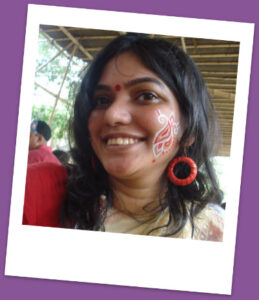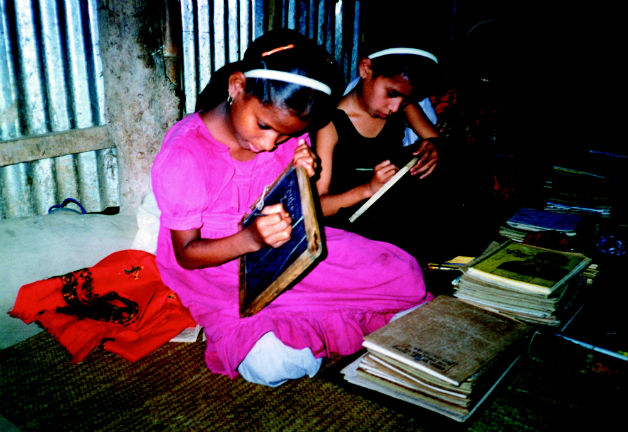"Multilingualism is our ally in ensuring quality education for all"
March 27 Forty years after independence, many indigenous peoples in Bangladesh continue to face barriers to learning and participation in the public realm owing to the language they speak. Mehzabin Ahmed, 28, a Commonwealth Correspondent from Dhaka, reports.
Forty years after independence, many indigenous peoples in Bangladesh continue to face barriers to learning and participation in the public realm owing to the language they speak. Mehzabin Ahmed, 28, a Commonwealth Correspondent from Dhaka, reports.
On the sad and historic day of 21 February 1952, the Pakistani police force opened fire on a group of peaceful Bangladeshi protesters and activists, who were demanding equal status for their native tongue, Bangla, as the state language.
It resulted in the death, among others, of our martyrs, Rafiq, Barkat, Jabbar and Salam.
Not only did the language divide back then bar Bangladeshis from learning in their own language – in their schools and universities – it made it harder for them to comprehend and gain access to information and knowledge.
It affected their everyday employment opportunities as well. No longer could they secure a job, unless they knew Urdu, a language which is very distinct and alien from Bangla, with a completely different set of scripts. Bangla was banned from all forms of official use, including coins, stamps, and recruitment tests for the navy.
Forty years after independence, today, Bangladesh faces a new challenge. In the home of the language movement, our indigenous peoples are still struggling with a language barrier of their own.
While 98 per cent of the population speak the national language, Bangla, there are also more than 45 indigenous groups which form linguistic minorities in the country, speaking more than 30 different languages. These are ethno-linguistically different from the majority of the Bangla-speaking population.
Having an unfamiliar language as a medium of instruction seriously affects the education rates of the indigenous peoples in our country. “The dropout rate among the indigenous students at the primary level is 50 per cent, and 33 per cent of these cases occur due to language barriers, according to a study conducted by Research and Development Collective (RDC)”[1].
The National Strategy for Accelerated Poverty Reduction II (PRSP II) Bangladesh states that some of the “hard core poor” in Bangladesh are found among the indigenous communities. Among PRSP II’s interventions to tackle the situation, it states that a national language policy will be formulated to safeguard the languages of indigenous peoples while an action plan on mainstreaming the education of indigenous children will be implemented.
On the other hand, the National Education Policy 2010 of Bangladesh formulated a first-language-based education policy for the primary education of the indigenous peoples in the country, complemented by the National Women Development Policy 2011 and National Child Policy 2011. While a first step towards progress has been made through formulation of such policies, its proper implementation by the government remains yet to be seen.
However, the system can have crucial effect on indigenous peoples’ access to education and employment, enhancing their identity, culture as well as livelihoods. According to Irina Bokova, Director-General of UNESCO, “The language of our thoughts and our emotions is our most valuable asset. Multilingualism is our ally in ensuring quality education for all, in promoting inclusion and in combating discrimination.”
This year the theme of the International Mother Language day was “Mother tongue instruction and inclusive education”. UNESCO highlights the importance of mother tongues as part of the right to education and encourages its member states to promote instruction and education in peoples’ mother tongue. Language, one of the unique yet diverse traits of human beings, is interlinked with one’s identity, culture, heritage, communications, freedom of speech, socio-economic status, and even one’s mere existence.
Remembering 21 February, International Mother Language Day, commemorating the Bangla Language Martyrs Day of 1952, let us stand together as a national and international community to uphold one of our many crucial rights as human beings, our rights to linguistics and culture, while we don’t forget the others left behind. Let us shape our visions of the world together, in symphony and harmony. In the galaxy of languages, every word is a star.
It is also about time, we started viewing language in one of its crucial roles in human civilization. “Language is technology.”
[1] Urmee, Farhana, “Indigenous children lack access to education”, The Daily Star, 27 February 2010 http://www.thedailystar.net/newDesign/news-details.php?nid=128050
…………………………………………………………………………………………………………………
About me:
“I come from Bangladesh, home to the Royal Bengal tigers and the longest natural beach in the world. I am passionate about working for sustainable solutions to development. I currently work as a development practitioner in Dhaka, Bangladesh. I am also a freelance journalist and a novice debater.
“I am bilingual in Bangla and English. I love learning new languages, and am a keen but elementary student of French. What I have learnt from wise words and life experiences is that, “If you want others to change, you have to be willing to change yourself as well”. Feel free to call me Simi.
…………………………………………………………………………………………………………………
Opinions expressed in this article are those of the author and do not necessarily represent the views of the Commonwealth Youth Programme. Articles are published in a spirit of dialogue, respect and understanding. If you disagree, why not submit a response?
To learn more about becoming a Commonwealth Correspondent please visit: http://www.yourcommonwealth.org/submit-articles/commonwealthcorrespondents/
…………………………………………………………………………………………………………………






